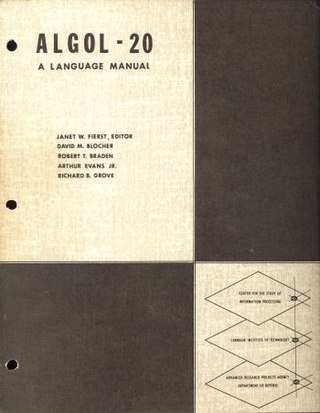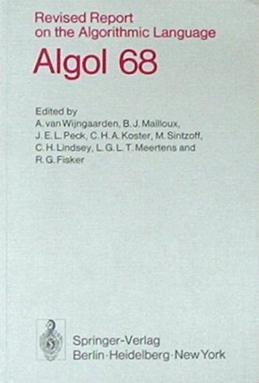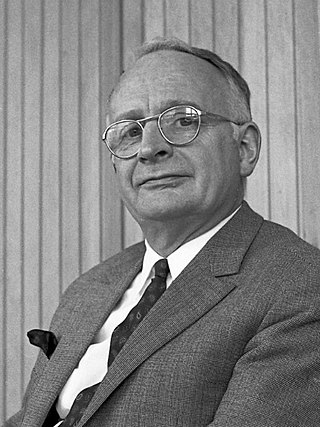
ALGOL is a family of imperative computer programming languages originally developed in 1958. ALGOL heavily influenced many other languages and was the standard method for algorithm description used by the Association for Computing Machinery (ACM) in textbooks and academic sources for more than thirty years.
Mary is a programming language designed and implemented by RUNIT at Trondheim, Norway in the 1970s. It borrowed many features from ALGOL 68 but was designed for systems programming.
PL/I is a procedural, imperative computer programming language initially developed by IBM. It is designed for scientific, engineering, business and system programming. It has been in continuous use by academic, commercial and industrial organizations since it was introduced in the 1960s.
Pascal is an imperative and procedural programming language, designed by Niklaus Wirth as a small, efficient language intended to encourage good programming practices using structured programming and data structuring. It is named after French mathematician, philosopher and physicist Blaise Pascal.

The Michigan Terminal System (MTS) is one of the first time-sharing computer operating systems. Created in 1967 at the University of Michigan for use on IBM S/360-67, S/370 and compatible mainframe computers, it was developed and used by a consortium of eight universities in the United States, Canada, and the United Kingdom over a period of 33 years.

MUSIC/SP was developed at McGill University in the 1970s from an early IBM time-sharing system called RAX.
Dartmouth BASIC is the original version of the BASIC programming language. It was designed by two professors at Dartmouth College, John G. Kemeny and Thomas E. Kurtz. With the underlying Dartmouth Time Sharing System (DTSS), it offered an interactive programming environment to all undergraduates as well as the larger university community.
TOPS-10 System is a discontinued operating system from Digital Equipment Corporation (DEC) for the PDP-10 mainframe computer family. Launched in 1967, TOPS-10 evolved from the earlier "Monitor" software for the PDP-6 and PDP-10 computers; this was renamed to TOPS-10 in 1970.

ALGOL 68 is an imperative programming language that was conceived as a successor to the ALGOL 60 programming language, designed with the goal of a much wider scope of application and more rigorously defined syntax and semantics.

Adriaan "Aad" van Wijngaarden was a Dutch mathematician and computer scientist. Trained as a mechanical engineer, Van Wijngaarden emphasized and promoted the mathematical aspects of computing, first in numerical analysis, then in programming languages and finally in design principles of such languages.
ALGOL 68C is an imperative computer programming language, a dialect of ALGOL 68, that was developed by Stephen R. Bourne and Michael Guy to program the Cambridge Algebra System (CAMAL). The initial compiler was written in the Princeton Syntax Compiler that was implemented by J. H. Mathewman at Cambridge.
John Edward Lancelot Peck was the first permanent Head of Department of Computer Science at the University of British Columbia (UBC). He remained the Head of Department from 1969 to 1977.
Barry James Mailloux obtained his Master of Science (M.Sc.) in numerical analysis in 1963. From 1966, he studied at Amsterdam's Mathematisch Centrum under Adriaan van Wijngaarden, earning a Doctor of Philosophy (Ph.D.) in 1968.

Cornelis Hermanus Antonius "Kees" Koster was a Dutch computer scientist who was a professor in the Department of Informatics at the Radboud University Nijmegen in the Netherlands.
Lambert Guillaume Louis Théodore Meertens or L.G.L.T. Meertens is a Dutch computer scientist and professor. As of 2020, he is a researcher at the Kestrel Institute, a nonprofit computer science research center in Palo Alto's Stanford Research Park.
ALGOL 68-R was the first implementation of the Algorithmic Language ALGOL 68.
Charles Hodgson Lindsey was a British computer scientist, most known for his involvement with the programming language ALGOL 68.
Dartmouth ALGOL 30 was a 1960s-era implementation, first of the ALGOL 58 programming language and then of ALGOL 60. It is named after the computer on which it ran: a Librascope General Precision (LGP-30) desk-size computer acquired by Dartmouth College in 1959.
IFIP Working Group 2.1 on Algorithmic Languages and Calculi is a working group of the International Federation for Information Processing (IFIP).
Susan Bond, was a scientific officer and computer programmer for the Mathematics Division of the Royal Radar Establishment (RRE) in the United Kingdom. She worked extensively on the programming language ALGOL 68 and the Royal Radar Establishment Automatic Computer (RREAC), an early solid-state electronics, ICL 1907F computer.





